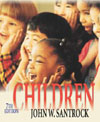 |  Children, 7/e John W. Santrock,
University of Texas, Dallas
The Science of Development
Web Links (Referenced in Text Margins)Generating Research Ideas
(http://www.cs.queensu.ca/research.html)
This web site has good strategies for generating research ideas with opportunities for you to learn how theories are formed, research hypotheses are generated, and evaluated, and how science progresses. |
 |  |  | Developmental Research Journals
(http://www.socialpsychology.org/develop.htm)
Child Development
http://www.srcd.org/
The web site of the Society for Research in Child Development provides information about this excellent research journal. How to become a student member of this organization is described. |
 |  |  | Developmental Psychology
(http://www.apa.org/journals/dev.html)
The web site of the American Psychological Association's main journal that includes research on children's development. Links to abstracts of current articles. |
 |  |  | Freud's Theory
(http://www.psychoanalysis.org/)
The web site of the Abraham A. Brill Library of the New York Psychoanalytic Association with extensive information about Freud's theory, and links to personality research programs with psychoanalytic orientation. |
 |  |  | Horney's Theory
(http://www.ship.edu/~cgboeree/horney.html)
(A description is not provided.) |
 |  |  | Piaget's Theory
(http://classweb.gmu.edu/awinsler/ordp/cogdev.html)
Lev Vygotsky
http://www.marxists.org/archive/vygotsky/ |
 |  |  | Vygotsky's Theory
(http://tip.psychology.org/vygotsky.html)
Describes the basic views of Vygotsky; includes biographical information and implications of Vygotsky's view for education. |
 |  |  | Behavioral and Social Cognitive Theories
(http://chiron.valdosta.edu/whuitt/col/soccog/soclrn.html)
Focuses on Bandura's social learning views, especially observational learning. Includes a link to information about behaviorism. |
 |  |  | Classical Conditioning
(http://chiron.valdosta.edu/whuitt/col/behsys/classcnd.html)
Albert Bandura
http://www.ship.edu/~cgboeree/bandura.html
Provides a biography of Bandura and information about his views on observational learning, television and violence, and personality development. |
 |  |  | Exploring Ethology
(http://www.oeaw.ac.at/klivv/)
Explore ethological curiosities, including many aspects of animal behavior. |
 |  |  | Brofenbrenner's Theory
(http://www.human.cornell.edu/faculty/facultybio.cfm?netid=ub11&facs=1)
Brofenbrenner's personal web site with his comments about his current interests. |
 |  |  | Brofenbrenner and a Multicultural Framework
(http://www.treatment.org/taps/tap20/tap20debord.html)
Explores Brofenbrenner's ecological, contextual theory in terms of community diversity issues and a multicultural framework. |
 |  |  | Correlational Research
(http://trochim.human.cornell.edu/tutorial/lamar/ylamar.htm)
Extensive information about correlational research. You can study correlation and causality. Uses of the correlational method, how to plan various correlational studies, common mistakes in correlational studies, and understanding correlational statistics. |
 |  |  | Experimental Research
(http://trochim.human.cornell.edu/kb/desexper.htm)
Helps you learn about how the experimental method works. |
|



 2003 McGraw-Hill Higher Education
2003 McGraw-Hill Higher Education